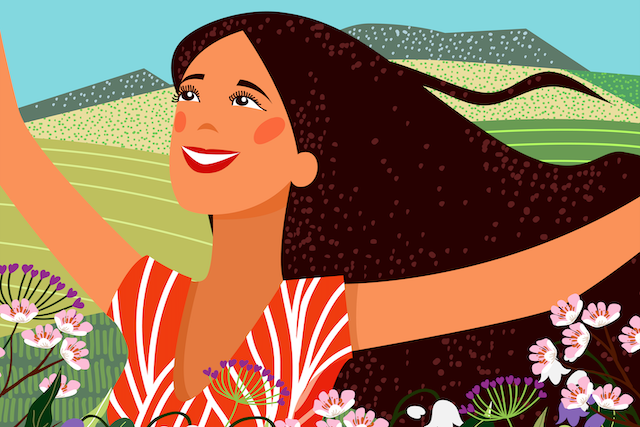
“When the world feels like an emotional roller coaster, steady yourself with simple rituals. Do the dishes. Fold the laundry. Water the plants. Simplicity attracts wisdom.” ~Unknown
I’ve suffered from anxiety since my childhood, but it was only seven years ago that I was formally diagnosed.
My symptoms began to get worse after my long-term relationship ended and I felt like my world had collapsed around me.
I was suffering from extreme fatigue, having trouble concentrating, not sleeping well, and I was constantly worrying.
Over the next couple of years my mental health continued to deteriorate, and I had trouble finding the energy or motivation to get through the day.
Eventually, I quit my high-stress government job and moved back to my hometown to live with my elderly mother.
I was unemployed for the first time in my life, and I struggled to find a reason to get out of bed in the mornings.
I was prescribed medication for my anxiety, but I suffered from weight gain and other side effects from the treatment.
After seeing no improvement from the medication, I decided to try healing myself naturally.
I sought advice from a variety of different practitioners including a naturopath, herbalist, and kinesiologist, which helped a bit, but I was still worrying excessively, having negative thoughts and occasional panic attacks.
I’d read about the benefits of gardening for mental health, so one day I decided to tackle the overgrown mess in the corner of my mom’s backyard.
At first the task seemed overwhelming, but I spent about fifteen to twenty minutes each day digging up weeds, and after a week it was looking like a proper garden again.
I wasn’t an experienced gardener, so I did some research to find out which vegetables were the easiest to grow.
I settled on lettuce, tomatoes, cucumbers, and zucchinis and I bought the seedlings from my local nursery.
As well as the plants, I also installed a small bird bath so I could watch the birds while I was out in the garden.
I really enjoyed watching the birds splashing around, so my next project was to make a bird feeder so I could attract more birds to the yard.
Healing was a gradual process, and it took a few months before I noticed that my symptoms were improving.
I was feeling calmer and more centered, and I wasn’t worrying about every little thing.
The garden is now my sanctuary and the place where I feel the most peaceful.
Gardening has many physical and mental health benefits including:
Mindfulness
When I’m out in the garden my mind is fully focused on the task at hand, so I’m not stressing about things from the past or what’s going on in my life at the time.
I make an effort to appreciate and admire the beauty of the plants, and it’s really satisfying to watch them grow from tiny seedlings into mature plants.
As well as vegetables, I’m now also growing herbs and a variety of different flowers, which are great for attracting bees and butterflies to the garden.
Strength
When my anxiety was at its worst, I had no energy or motivation to exercise. Even just doing the bare minimum tasks like showering and cooking left me drained.
As I started spending more and more time in the garden, I noticed that my energy was improving and my body was getting stronger from all the bending, weeding, and digging I was doing.
Sunshine
Being out in the beautiful sunshine lifts my mood and it’s a great source of vitamin D, which can help to reduce the symptoms of anxiety and depression, while also boosting the immune system.
Nutrition
Being able to harvest beautiful fresh herbs and vegetables from my garden inspired me to try new, healthier recipes so I was eating better than I had in years.
The crisp lettuce and juicy tomatoes straight from the garden were so much more flavorful than anything I’d tasted from the grocery store, and I’m sure they were much more nutritious as well.
If you have the space in your backyard to create a little garden, I’d definitely recommend giving it a try.
What if you don’t have a garden?
Try container gardening.
There are many different vegetables that can be grown in containers including radishes, peppers, lettuce, spinach, and other salad greens.
Get some indoor plants.
Indoor plants are great for bringing a touch of nature indoors, and there are lots of compact plants that are ideal for apartments like succulents, air plants, or African violets.
If you have more space, you could try a peace lily, rubber plant, or prayer plant.
Create a windowsill garden.
If you have a nice, sunny windowsill you could start a small herb garden with parsley, chives, and thyme.
Herbs are fast growing, easy to care for and great for adding flavor to your meals.
Join a community garden.
Community gardens are popping up all over the place in cities around the country, and they’re great for meeting likeminded people who can share their gardening experience with you.
Spend time in nature.
If you’re not a green thumb you can still get the benefits of plants by getting out in nature.
Try going for a hike if you have trails nearby, take a walk around your local park, visit a botanical garden or read a book underneath a tree.
Next time you feel stressed or anxious, try surrounding yourself with plants and see if it helps you to feel calmer.
Whether it’s caring for a small house plant, creating a garden of your own, or simply spending more time in nature, your mental health will benefit from having plants around you.
I hope this has inspired you to give gardening a try!
About Kelly Taylor
Kelly Taylor is the founder of Urban Garden Gal, a website for beginner gardeners, specializing in small space gardening. She also runs Water Garden Advice where she shares her tips for creating and maintaining garden ponds.













 Though I run this site, it is not mine. It's ours. It's not about me. It's about us. Your stories and your wisdom are just as meaningful as mine.
Though I run this site, it is not mine. It's ours. It's not about me. It's about us. Your stories and your wisdom are just as meaningful as mine. 